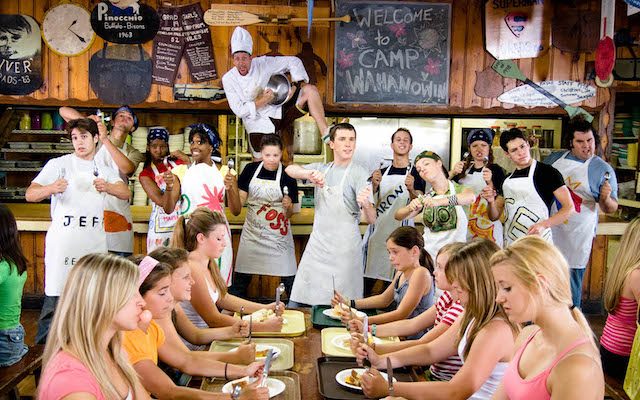
You probably remember the first time you saw “High School Musical,” the way it thrilled you and changed your life and filled your heart with Hudgens. Some people in Canada saw it, too, and were inspired to make a “High School Musical” to reflect their national values of politeness and subpar choreography.
The result was “King of the Camp,” a maple-flavored atrocity that aired on the Canadian equivalent of Nickelodeon, which is not called Nickeloodeoon, like you’d think, but YTV. “A YTV Original Movie,” the opening credits declare, though I don’t know if “original” is the word they were looking for. This squeaky-clean teen fantasia is set at a summer camp but follows the same basic story formula as “High School Musical,” in a transparent attempt to duplicate that movie’s popularity with female viewers age 12-15 (13-16 Canadian).
The setting is Camp Wahanowin, a place of natural beauty that is just like the U.S. summer camps you’ve seen in movies, except that the counselors are not being systematically murdered. Our nonthreatening Efronian outsider hero is Will Cross (Justin Stadnyk), a humble teen who has taken a summer job on the camp’s kitchen staff. He arrives at Camp Wahanowin to discover that behind the idyllic setting lies a strict and archaic caste system. The kitchen staff, consisting of ordinary middle-class slobs like himself, does NOT fraternize with the camp counselors, who are all snotty rich teenagers.
The snottiest, richest teenager, Chase Gunn (Isaac Haig), is the popped-collared son of the man who owns the camp and everything around it, and it is Chase who most rigidly enforces the social hierarchy. He derisively calls Will a “hayseed” and a “bumpkin,” overlooking the fact that they are both Canadian. But one of the counselors, Cindy Keyes (Ashley Carter), isn’t like that. She rolls her eyes at the class divisions, and she’s even nice to the new kitchen boy! This display of basic human decency means that they will fall in love.
Everything I’ve told you so far is conveyed in the film’s opening number, an upbeat tune called “Ready for It All” that sets the tone for the rest of the movie by establishing that the songs are going to be terrible and that you will not enjoy hearing them. After Will, Cindy, and Chase each sing a stanza laying out their own hopes and dreams, the entire cast sings about the camp experience:
It’s the best time of year
All our friends are here
It’s gonna be great, come on, get up and cheer!
We’re ready for it all
For the good times
Summer is here and we can do anything at all
For the first time
We feel like we’re ready
Feel like we’re ready for it all!
You and I would interpret this song to mean We are eager to have sex! But no. The movie is determined to be every bit as G-rated as a Canadian rip-off of a Disney Channel movie can be. Which is to say, very G-rated.
So what’s this “king of the camp” business all about? Oh, it is a very big deal at Camp Wahanowin. At the end of the summer, the campers are split into two groups to compete in an olympiad. Each side chooses a male and female counselor to be their captains, and the winning team’s captains are named king and queen of the camp. You’ll notice that, in order to prepare the campers for real life, the honor goes to the leaders rather than the people who do the actual work.
Despite this, the campers spend the entire summer consumed with excitement about the eventual coronation. It’s pitiful, really, like a classroom of students feverishly awaiting news of which faculty member has won Teacher of the Year. The campers even (of course) sing a song about how this is the only topic that interests them:
Here at camp there is no doubt
King and queen’s what we dream about
Everyone should strive to be
The closest thing to royalty
Kings and queens
And all it means
It’s all the kids are talking about!
The kids speak of nothing else! And remember, these are the campers, who are not even eligible to be king and queen. Why would they sing and dance so enthusiastically about something they can never have? Do they not understand that their status as non-counselors means the glory of which they dream shall never be theirs? Or is this the film’s poignant yet subtle way of reminding us that we, as humans, all yearn for things that remain forever just out of reach? For example, in my case, the DVD remote?
I will leave these deeper questions for the many doctoral dissertations that “King of the Camp” will no doubt inspire, for we must now return to the class warfare that is brewing. Our hero, Will Cross, does not like that he and his fellow kitchen employees are barred from socializing with counselors. Others in his station are complacent, but not Will! “It’s time for things to change around here!” he declares, adding, “It’s time for things to change!” (That is the film’s best line of dialogue.) Will is a political agitator, the likes of which Canada has not seen since 1782, when rabble-rouser Gordon Vancouver led a rebellion that ultimately put government in the hands of the people after decades of being controlled by beavers.
But the movie’s primary focus, obviously, is wakeboarding. You know, wakeboarding. It’s like waterskiing, but on a board instead of skis. I don’t know why it’s called wakeboarding when the more logical term would be waterboarding — OK, now that I say it I do see why. Anyway, Will happens to be great at wakeboarding, which happens to be the major thing that Chase is well known for at camp. This adds another dimension to their rivalry, bringing the total number of dimensions up to one.
In the film’s gripping finale, the end-of-summer olympiad ends in a tie, and the only way to settle a tie is to have the team captains face off in a wakeboarding contest (duh). Chase figures he’s got it in the bag, especially after the opposing captain is injured and must forfeit. But wait! Sarah the homesick girl comes running up and declares, “Camp rules say that a team can substitute their captain in the event of a default!” She’s not making that up, either: she has an actual rulebook in her hands, and she’s quoting from it. They take their camp olympiads very seriously in Canada.
So Will is recruited to compete with Chase in a wakeboarding jump, but first he overhears Chase being chewed out by his rich, jerky father, who owns the camp. Mr. Gunn hates the poors even more than Chase does, and he will NOT allow his camp’s good name to be sullied by a kitchen worker winning king of the camp. Chase assures his dad that he’ll win, and Mr. Gunn replies with this amazing speech:
“You better, son! Because if you don’t, you can go find another camp to work at! You’re a Gunn! If you lose, we lose everything. Our status, our stature! You’re nothing if you lose the jump. Nothing! End of discussion!”
Like I said, these competitions are very important in Canada. Their prime ministers are chosen the same way.
Knowing all this, Will is conflicted. Cindy tells him, “Beating Chase won’t make you king!” (Uh, it will, actually. Have you not been paying attention??) Will has nothing to prove, and Chase has so much to lose, so Will takes a fall and lets Chase win. Chase is humbled by Will’s decency, and after he’s crowned king of the camp, he publicly thanks the kitchen staff for all their hard work. “From now on, we stand together as one!” he cries. Well, of course the Canadian version of “High School Musical” would turn out to be about socialism.
So there is a lot going on here! Will and Cindy’s budding romance, Will’s rallying of the proletariat, the end-of-summer olympiad, Chase butting heads with Will — not to mention the agonized wails issuing from the victims who have been immobilized and forced to watch the movie (I assume this is how most people saw it). This is all plenty of activity for one film.
And yet the film insists on giving us more! There is also a subplot about a nerdy camper named Sarah who is homesick, though when I say “subplot” what I mean is that Sarah sings a song about being homesick, and then her homesickness is never mentioned again. There’s a similar “subplot” with Chase and his comic-relief pal Rob telling campers a ghost story — singing them a ghost song, actually — in order to extort candy from them. There’s a section where Chase dumps his plastic girlfriend Jackie for another counselor, and says it’s because the other counselor and her friends are hotter. (In Chase’s defense, this is true.) The kitchen staff does a musical number about what a thankless job it is to work in a summer camp mess hall, and this reminded me of those theme restaurants where the waitstaff occasionally breaks into song, and how much I hate them.
In closing, I’d like to say a few words about the film’s 3,275 musical numbers. I’m not prepared to say that these are the worst songs I’ve ever heard, as I’ve seen a lot of musicals produced by community theater groups that were written by the community theater’s director’s wife, and I also listened to the radio in the 1990s. But these are certainly among the most generic songs I’ve encountered, sung on-key but otherwise without distinction by bland performers as they trudge through dull choreography with vacuous grins pasted on their bored, wholesome faces. (Someone has compiled a montage of musical clips that you can watch.) If you’ve ever had to attend a younger sibling’s dance recital or school play, you’ve seen a show that is probably of a higher calibre than “King of the Camp,” which does not even have the decency to serve cookies and punch afterward.
— Film.com





